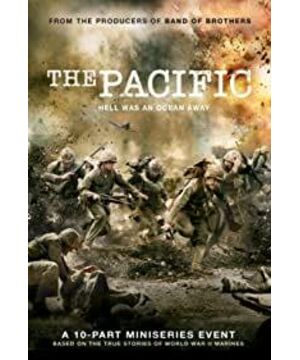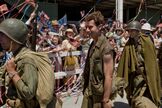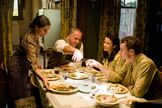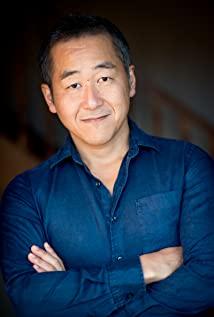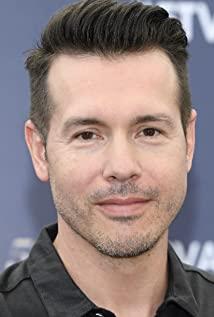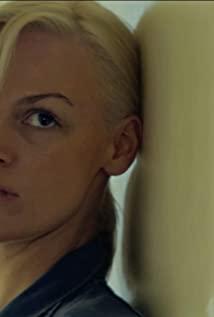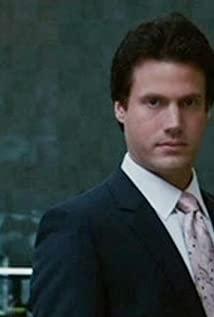I don't know how to describe the horrors of the Pacific War. Maybe the driver who took Luckie home in the last episode said it best, he said, I might've jumped into Normandy, but at least I got some liberities in London and Paris .You GI-rines ,you got nothing but jungle rot and malaria. Anyone who has watched "Field Platoon" should know how depressing jungle warfare is. Although I personally feel that the show's performance on jungle warfare is not as vivid and profound as "Field Platoon", there are also many people because of the oppressive atmosphere and long-term combat. Murder and go crazy. I thought Eugene was crazy too, but fortunately, when facing the Japanese boy, he put down his gun, and when someone else killed that Jap, he said, he is still a child!
War is too cruel, people are just machines. I remember an episode where a group of Japanese soldiers came out and charged, and in the end there was only one left alive, and he was standing in the pool, sobbing, and he probably kept asking himself in his mind, what the hell was all this for and for. The U.S. soldiers shot him one by one. It was really sad. In the end, Luckie gave him a shot. Death was the best relief for him, just like Sledge, according to the mother's wishes, also gave him Her last bullet.
All I want to say about Basilone is his love. He was awarded the Congressional Medal, and was promoted as a hero by the authorities at home, as the face of war bonds. But he was tired of it all, he wanted to go to the battlefield, so he took the initiative to extend his service period, went to Iwo Jima, and finally fell. Her wife, Lena, they've only been married for seven months! The final subtitle says, She never married and died until 1991. This may not be the whole of love, but it is the most moving.
The last episode is a classic. The war was over, and when the news came back to Luckie's ward, while everyone was celebrating, he and his comrades in bed were silent. Snafu and Eugene were on the hill watching their comrades celebrate wildly, and they just chatted in silence until a captain came over and gave them a bottle of wine before taking a few sips.
When saying goodbye on the train, Burgin was the first to leave. He didn't hug Snafu and Eugene, he just said a few words, exchanged a few glances, and went down, hugging his father and younger brother. Then Snafu, Eugene fell asleep as he went, and he went down by himself. The final subtitle states that he had not been in contact with any of his comrades for the next thirty-five years until he had seen Eugene's memoirs. The subtitle also states that Eugene was one of those carrying the coffin when Snafu died in 1993. I can really understand Snafu's behavior, he doesn't want to think of a single memory of the war anymore. I like Snafu very much. He speaks slowly and gives people nicknames. He seems to be the most optimistic, but perhaps, his heart is the most bitter. Often the person with the most pain in his heart always hides his heart.
Eugene has been unable to adapt to life after returning home, probably only when the veterans were placed, he chose to go to college, the young lady kept asking him what you learned in the military that will allow you to continue your studies in college. He bent down and said to the lady, I've learned the fuck how to kill Japanese.
He slept with nightmares and refused to dance. His father took him out hunting, and he was suddenly in the picturesque woods, weeping in his father's arms. He was in the shade of a tree, and his mother brought him a Coke and asked him what his plans were.
He said his plan was to do nothing.
His father met and let his mother leave him alone.
His mother said he was like a child.
Father said he was a man.
Eugene eventually became a PhD in biology.
This film made me know for the first time, really for the first time, how terrible a war is and how ugly human nature is. Some people can sacrifice their lives for so-called bullshit politics. cost. The Japanese are human too. Originally they had families, children and a living, but on the battlefield they had to resist until they died in battle. The Japanese soldiers should never be condemned by them, but their positions were inconsistent. On the battlefield, they were not human beings. , just a screw in a massive war machine. The duty of soldiers is to obey orders, they have no right to choose.
People who have experienced life and death together, it is a friendship that does not need words or hugs. The friendship is so great that it seems plain as family.
I would like to express my great respect for the people who lived through the war.
View more about The Pacific reviews


